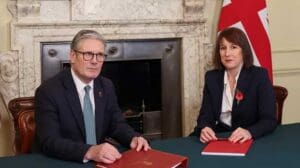
Starmer strengthens grip on economic policy with new Budget Board
Prime Minister Keir Starmer is tightening control over the government’s economic strategy by strengthening a cross-government Budget Board that will shape the Autumn Statement on 26 November.
The board, which will meet weekly, is designed to ensure closer coordination between No 10 and the Treasury after criticism of Chancellor Rachel Reeves’s first Budget, which drew backlash from business groups over steep tax rises.
The new structure will be co-chaired by Torsten Bell, pensions minister and former director of the Resolution Foundation, and Minouche Shafik, Starmer’s recently appointed chief economic adviser.
The committee will also include Katie Martin, Reeves’s chief of staff, tasked with managing relations with business; Varun Chandra, No 10’s business envoy; Darren Jones, the new Chief Secretary to the Treasury; and Starmer’s chief of staff Morgan McSweeney.
Both No 10 and No 11 communications chiefs will sit on the board, alongside Tim Allan, Starmer’s newly appointed comms director and a veteran of Tony Blair’s government.
Government insiders said the expanded line-up was designed to align economic and political messaging while injecting a stronger business perspective into budget discussions.
Pressure on Reeves as fiscal rules tighten
Chancellor Rachel Reeves faces growing pressure ahead of November’s Budget, with the Office for Budget Responsibility (OBR) expected to downgrade forecasts. To stay within her self-imposed fiscal rules, she may need to find £25bn–£50bn in additional tax rises, according to independent estimates.
Reeves was criticised after her last Budget for raising employer national insurance contributions by £25bn, a move business leaders said increased hiring costs and fuelled inflationary pressures.
Rain Newton-Smith, director-general of the CBI, has urged the government to pursue “radical tax reform” rather than more tax hikes, pointing to stamp duty and VAT thresholds as areas in need of overhaul.
The Institute of Directors (IoD) welcomed the creation of the Budget Board but called for greater business representation.
Anna Leach, IoD chief economist, said: “It is positive that the government is putting renewed energy into the growth agenda, with a particular focus on business. But to succeed, the Budget Board must deliver a statement that works for enterprise, with swift action to remove barriers to growth from the tax and regulatory system.”
She added that incorporating independent business voices into the board would help “constructively challenge” government thinking and bring specialist expertise to budget planning.
The strengthened Budget Board underlines Starmer’s determination to centralise economic decision-making and avoid the political missteps of recent months. But with sluggish growth, falling business confidence and difficult fiscal choices ahead, the test will be whether this new forum can balance Labour’s fiscal discipline with a pro-growth agenda that reassures enterprise.



